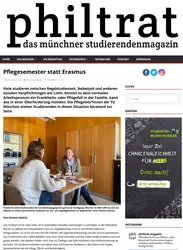Initial information and contact in difficult life situations
Taking care of a family member on short notice raises many questions. How can I ensure they receive the best possible care? How can I balance my career or studies with caring for my partner, parents, or children? We are here to provide answers to all your care-related questions and offer a range of support services. You can reach out to us with complete confidence.
Company care guides
All TUM members can reach out to the university's care guides (Pflegelotsinnen and Pflegelotsen) for assistance with balancing caregiving responsibilities and work. They are available for support in person, by phone, or via email.
Lectures on the topic of care
The TUM Family Service of the Staff Unit Diversity and Inclusion offers a series of lectures focused on the topic of care and caregiving. These lectures are free and open to all TUM employees and students.
In the event of sudden caregiving needs, employees can make use of legally regulated leave options to better manage both work and family responsibilities.
Short-Term Absence from Work
In urgent caregiving situations, employees may take up to 10 working days off to arrange or provide immediate care for a close relative.
Caregiver Leave
Employees have the option to take full or partial leave from work for up to six months in order to provide more intensive care at home.
Family Caregiver Leave
To support long-term caregiving, employees can reduce their working hours to a minimum of 15 hours per week for up to 24 months. Family caregiver leave can directly follow care leave.
More detailed information about your options under the Caregiver Leave Act and the Family Caregiver Leave Act can be found on the TUM Dienstleistungskompass (only in German)
Family caregivers who provide care for a close relative for at least ten hours per week on at least two days may, under certain conditions, be entitled to pension insurance contributions without having to pay them personally. Accident insurance may also be covered by the long-term care insurance fund. These measures aim to ensure the social security of family caregivers and to acknowledge their contribution to the care system.
More information of the website of the German Federal Ministry of Health and on the website of the German pension insurance / Deutschen Rentenversicherung (only in German)
“Young carers” are young people who take on significant, long-term responsibility for caring for a family member. Balancing these caregiving duties with their own lives and studies can be especially challenging.
Students can take a temporary leave of absence from their studies for important personal reasons — including the care of a close relative. Detailed information on how to take a leave of absence at TUM is available on this page.
Are you caring for a relative? You can find information on support and relief options through the Pausentaste program.
Pflegefinder Bayern is a digital platform provided by the Bavarian Ministry of Health, designed to help users quickly and easily find suitable care services in Bavaria – whether home care, residential care, or advisory services. With practical filters, a color-coded availability system, and direct contact options to care providers, the Pflegefinder makes it easier to find the right support.
Here you get an overview of the relief options caregiving relatives can take advantage of and you can find out which services are covered by the long-term care insurance funds.
Since January 1, 2009, all those in need of care and their relatives have an individual right to comprehensive care advice from their care insurance fund and so-called case management (Section 7a SGB XI). In addition to your long-term care insurance, the following care advice centers offer prompt and, if required, anonymous assistance. They provide guidance on planning care and your entitlements to benefits from statutory long-term care insurance. You will also receive information on care aids, care classification procedures and service providers in your area.
Long-term care insurance supports individuals who need assistance in daily life — whether due to age, illness, or disability. Depending on the level of care required and personal circumstances, it offers financial support for home care, professional care services, or residence in a care facility. The aim is to alleviate the burden on those affected and their families.
Further information are available on the website of the federal ministry of justice (only in German).
Advance care documents help you record your personal wishes and decisions in case of an emergency. These include, for example, a living will, a power of attorney for health care, and a care directive. They ensure that, in a serious situation, everything is handled according to your wishes — even if you're no longer able to communicate them yourself.

